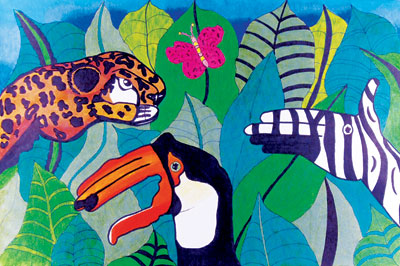All Nonfiction
- Bullying
- Books
- Academic
- Author Interviews
- Celebrity interviews
- College Articles
- College Essays
- Educator of the Year
- Heroes
- Interviews
- Memoir
- Personal Experience
- Sports
- Travel & Culture
All Opinions
- Bullying
- Current Events / Politics
- Discrimination
- Drugs / Alcohol / Smoking
- Entertainment / Celebrities
- Environment
- Love / Relationships
- Movies / Music / TV
- Pop Culture / Trends
- School / College
- Social Issues / Civics
- Spirituality / Religion
- Sports / Hobbies
All Hot Topics
- Bullying
- Community Service
- Environment
- Health
- Letters to the Editor
- Pride & Prejudice
- What Matters
- Back
Summer Guide
- Program Links
- Program Reviews
- Back
College Guide
- College Links
- College Reviews
- College Essays
- College Articles
- Back
One Step Closer
Our precious planet Earth has a great biodiversity. So many different plants and animals reside here. This is quickly changing and soon may become irreversible. There are so many links between us, animals, and plants that everything affects each other. Therefore, what we do can help or hurt the environment around us, our environment. It is the only one we have, and each species is a valuable and amazing work.
One terrific landscape that supports so many of the world’s animals and plants is the rainforest. However, as deforestation occurs, the number of species dwindles. In fact, by 2050, nearly all the rainforest could be gone. Deforestation needs to be put to a stop; otherwise plants and animals will become extinct, lost in the world, never to be seen again. Deforestation is a problem, and can be caused by need for farmland, generally in areas where poverty is a problem and education is not accessible. If farmers need more space to grow crops and keep livestock, they will cut down these valuable trees that have been standing, some for thousands of years. Problems arise, and one such is that landslides can occur and wipe out entire villages, which backfires on the farmers. This is the result of the fact that the roots that held the soil together for such a long time suddenly vanish and when rain pours down the soil is unstable and cannot stay. The animals, plants, and humans supported by the rainforest die, and the Earth is one step closer to endangerment.
Protecting species is vital and beneficial to us because plants have helped advance medicines that are cures for diseases. About 40% of prescription medicines contain plants. However, only 5% of plants have been checked for medicinal purposes. Trees, specifically the Pacific yew, that have experienced deforestation and were burned have now been discovered to be a cure for breast cancer. Another plant, the purple foxglove, helps people recover from heart attacks and without it they would die within 3 days. More discoveries like this can be made, but only if everyone pitches in. Only then will the world be one step closer to making more great discoveries in nature.
In addition, nature is absolutely beautiful. Look outside in any season, and nature can magnificently present itself. Because of this, many people take trips to enjoy this wildlife, which helps our economy. In fact, Americans spend around 59 billion dollars per year on activities to experience this phenomenal wildlife, such as through traveling. If we let species become endangered and extinct, people will not be able to enjoy nature as much, monetary gain going down, and entire ecosystems are threatened. While it costs money to restore species, it will be beneficial long term both economically and recreationally, and our Earth will be one step closer to becoming even more enjoyable.
Some laws have been put into place to help endangered species from becoming extinct, such as the ESA (Endangered Species Act). In 1973, laws were passed to prohibit destruction of animals identified as endangered, along with their natural habitat. People cannot take them from their habitat, and endangered species cannot be traded, imported, or exported. This enables species to thrive so that humans are not interfering, and it is necessary to abide and promote acts like this. This is important because if one plant species becomes extinct, about 30 other plant, animal, and insect species can become extinct too. The ESA successfully brought back species from endangerment, such as the gray wolf and the bald eagle. When actions like this are taken, it helps balance the natural ecosystem and food chain. It may be argued that this is unnecessary to save these animals because species naturally become extinct, however right now the rate of extinction is 1,000 to 10,000 times that natural rate. There are many factors that contribute to this, such as destruction of land, overexploitation, and pollution, which humans are responsible for. We can help reverse the fact that species that are threatened by abiding by laws, donating, and supporting organizations to protect these animals. There are many recovery plans for individual species, so with support these will be able to go into effect. Through this, we will be one step closer to saving the planet.
In conclusion, conserving endangered species is vital and beneficial in many ways. If we let a few species slide, what would happen to all the others? This is a problem we need to address now before it becomes out of hand and we let future generations be forced to deal with all the negative problems. Whether it’s recycling, using compost rather than chemical fertilizers, donating, planting native foliage, or having a birdhouse, every act of support, no matter how small, makes a difference. If everyone tries, the earth, our planet, will have beautiful rewards for us. So, think about it. How will you support taking one step closer to saving these endangered species before it’s too late?

Similar Articles
JOIN THE DISCUSSION
This article has 0 comments.
